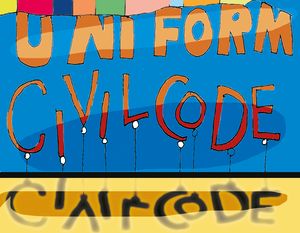Now that the prime minister has come out and batted for the Uniform Civil Code on the front foot, it is no longer a theoretical debate. The immediate responses have been along predictable lines—right-wing supporters of the BJP have defended it, and the religious orthodoxy and the political opposition have flayed it.
The blanket opposition to the push for a common family law is a short-sighted and ill-advised response. And, in fact, the more the opposition allies with conservative religious bodies, with mostly archaic ideas about sexuality and gender rights, the more it would help the ruling party.
A uniform civil code is a directive principle of the Constitution. It had the support of the great architects of modern India, including Nehru, Ambedkar and Ram Manohar Lohia. Its philosophical essence is equality.
A uniform civil code is not a Hindu civil code; nor does it mean the homogenisation of culture, faith or rituals. At its heart, a well-drafted UCC should simply be a law that protects the equality of all citizens. Indians would still be free to profess, propagate and practise their own religions—another constitutionally enshrined fundamental right—as long as these tenets did not violate a fundamental principle of equality.
In general, personal laws of all faiths, especially as interpreted by the clergy of that particular religion, can often militate against women. A uniform civil code is an opportunity for India’s feminist movement to reframe the conversation around equality within the framework of the Constitution.
Not everyone who supports the idea of a uniform civil code is making a political affiliation. In the past, individuals as varied as musician T.M. Krishna and author Nilanjana Roy drafted their own talking points, for what they called a ‘progressive uniform civil code’. Both happen to be staunch critics of the Modi government.
Instead of rejecting the very idea of the uniform civil code and ceding the entire space of its debate to the BJP, the opposition, as well as religious bodies, should engage strenuously on what such a code looks like. Goa, which has long had a uniform civil code, can be an educative example for a robust public debate on what has worked and what has not.
The debate around the uniform civil code can, in fact, be used to demand the strengthening of the Special Marriage Act, a civil law that permits union of interfaith couples. Right now, the act remains shackled by bureaucratic hurdles. The UCC debate actually allows a strong counter to those who classify every Hindu-Muslim union as an example of what BJP leaders call ‘Love Jihad’.
Sure, the BJP is bound to bring its own ideas of such a code to the debate. But, if civil rights groups, opposition parties and religious groups decline to be part of this discussion, it would be an own goal.
The resistance to the UCC, as well as the support for it, should be focused on what the details of such a code might look like. And there are drafts that have been prepared by the Law Commission in the past that could be a starting point.
The Uniform Civil Code should be seen for what it is—a constitutional ideal.
editor@theweek.in


